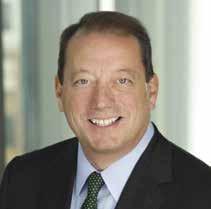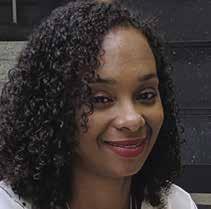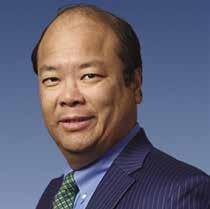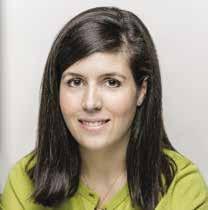
8 minute read
Alumni Navigate The New Normal
Alumni
JIM HERSCHLEIN

BRITTANY IRVING
Navigate the New

ROBERT MOY

JESSICA PALMESE
Normal
J
IM HERSCHLEIN ’85 remembers wondering, “What are we supposed to do?” If there was one thought, one question ricocheting through offices as the pandemic emptied them last year, that was it. But there wasn’t much time for thinking or questioning. Herschlein, the Co-Chair of Complex Litigation at Arnold & Porter Kaye Scholer LLP, along with St. John’s Law alumni in New York, across the country, and around the world, had to figure out how to navigate lawyering in the new normal.
“I had a very strong feeling of being in a play as it was being written,” Herschlein says. “Nobody knew what was to be done, or for that matter what next was to be done, or what conditions were next to be encountered. But we quickly realized we had to take action to serve our clients and—as importantly —to keep our lawyers and staff connected and engaged.” With his team, Herschlein reached out to see how clients were handling the pandemic professionally and personally and to discuss issues they were facing or anticipating. He also adjusted to an ever-changing court schedule as shutdown protocols delayed appearances and adjourned trials.
For Herschlein, and millions of other attorneys fortunate enough to have reliable access, technology facilitated the transition to working from home. “As much as I prefer being in person, and look forward to the day that returns more fully, the biggest surprise for me is how much you can get done with a laptop, a camera, and a strong Wi-Fi signal,” he says. “From video court proceedings,
to litigation department meetings via Zoom, to online CLE, as time went by, we got used to ‘Virtual Operating Status,’ as my firm refers to it.”
Even with the switch to virtual operations, Herschlein’s litigation practice remains robust. For one new matter, he successfully advocated for the Archdiocese of New York when New York City refused to fund COVID testing for Catholic school students. His Eminence Timothy Cardinal Dolan, Archbishop of New York, recognized Herschlein’s victory during a service at St. Patrick’s Cathedral. “It was quite an honor, which wouldn’t have happened other than for litigation arising from the pandemic,” says Herschlein.
Pandemic lawyering also came with an unexpected upside for BRITTANY (MOORE) IRVING ’10, a staff attorney with the Legal Aid Society’s Criminal Defense Practice in Manhattan. “I have a new appreciation for digital record keeping,” she shares. “I had a very paper-heavy practice. But with the pandemic, my office switched to email scheduling and I started to keep an electronic calendar, which is far more accessible than my print calendar book. Also, since I no longer receive stacks of paper discovery, I now use a system of electronic organization, which helps me share case information with my colleagues more easily.”
Still, Irving says, the public health crisis created a number of challenges for her and her clients. “Our administrators were great about getting us the tools we need to work from home, but this pandemic exposed the disadvantages some clients face because they don’t have smartphones and can’t appear in court virtually,” she explains. “The internet is inconsistent, or it’s too noisy and our clients can’t follow the proceeding, or hear me as I try to counsel them. I had clients who appeared in person and the courts turned them away. Some of these issues have alleviated over time, but there’s still a concern for people whose lives are on hold because they can’t have their day in court.”
Even when they do get that court day, Irving and her clients face some big obstacles. “The court buildings are old and lack proper ventilation,” she says. “So many people are required to be in a courtroom at any one time that social distancing is impossible. It’s impossible to conduct trials in this way.” Outside the courtroom, Irving misses the daily, face-to-face interactions with her Legal Aid colleagues. “We benefit so much from being able to walk into each other’s offices,” she says. “Some of our best legal work is done at the ‘water cooler’ as we help each other think of creative ways to resolve cases, practice for jury trials, and flesh out suppression issues.” With the shift to working from home, Irving did gain some new colleagues in the form of her two young children. “Sharing a work space with my elementary-aged child was a struggle,” she admits. “Although his school did a fantastic job keeping him engaged, it was just difficult when he would be singing in music class and I needed to make a bail application or take testimony on a preliminary hearing in front of a judge. My three-year-old became lovingly known as my paralegal to some judges who were very understanding when he would interrupt. I often had to go into a bathroom or in the hallway of my building for quiet.”
Like Irving and Herschlein, ROBERT MOY ’88, a partner in the Tax, Trusts and Estates and Corporate and Mergers & Acquisitions practice groups at Forchelli Deegan Terrana LLP, has navigated professional and personal change during the pandemic. But it wasn’t the sudden shift to remote operations that surprised him. Rather, he couldn’t believe how quickly clients and colleagues made the jump to virtual business as usual.
“While it was a big adjustment, my firm was wellequipped to handle the transition,” Moy says. “We had easy and ready access to a remote server, and effectively and seamlessly switched communications to personnel working remotely. Back in the office, certain key personnel worked tirelessly on dayto-day administrative tasks to keep the firm fully operational.” Even with this support, pandemic lawyering presented its difficulties for Moy, who had to gain some technical skills quickly.
“Perhaps my biggest personal challenge was learning to use video conferencing services like Zoom and WebEx,” he says. “A large part of my practice involves meeting with clients and potential clients in person, and attending various networking and other functions in Manhattan and on Long Island. So, I had to pivot and start doing those activities online.” As he adjusted to his new virtual reality, Moy began to appreciate its benefits: notarizing documents for a closing, witnessing a will signing, conferencing with clients across time zones—it was all so efficient and easy that he sees how some virtual practices might endure after in-person work resumes.
Moy also appreciates the lasting impact that this past year will have on him personally. “The pandemic has made me more appreciative of my relationships,” he says. “I’ve reached out on Zoom to friends and family living in different states and overseas who I haven’t spoken to in a while, something I’ll continue doing when we’re no longer at a social distance. And I know many essential workers, and have several in the family. I’m definitely thankful to them, and to all essential workers, for what they do every day.” This past year, the personal and professional have also converged in new and different ways for JESSICA PALMESE ’05. A trial attorney and supervisor in the New York City Law Department’s Labor & Employment Law Division, she was in the middle of a trial in Kings County Supreme Court when everything suddenly shut down. “It was definitely an experience I’ll never forget,” she recalls. “Trials are, at their core, about human connection. So, this was a major disruptor for me and my colleagues. But, as the weeks went on, and after all the technical glitches ironed out, we adjusted to meeting, and connecting, over computer screens. Whether in virtual brainstorming sessions or administrative hearings, just as we’ve learned to smile with our eyes, I think we’ve done a wonderful job preparing and engaging in alternative ways.”
Working from a home she shares with three young children and her husband, Ron Palmese ’03, the Senior VP and General Counsel at Shake Shack, requires some firm boundary setting, Palmese says. “It can be so easy to lose the divide between work and home when you aren’t physically leaving to go into an office, but it’s so important for your own, and your family’s, wellbeing. We’ve had to be extra diligent about turning off our phones and computers.” She has also noticed a shift in people’s openness about their personal and family obligations. “Everyone is so much more transparent about commitments they are juggling alongside work, across all genders, situations and ages,” she notes.
As the vaccine rollout continues and many workers see the light at the end of the pandemic tunnel, Palmese thinks about the future of law practice in a reoriented world. “While the legal profession has traditionally required attorneys to report to an office for long days, I do believe there will be a realization that there are aspects of our work that can take place at home—or in a café. That said, I think our best work will still always take place in a room together, bouncing ideas off one another while digging through discovery looking for that smoking gun. I look forward to having those sessions again.”
Meanwhile, Palmese sees “a number of silver linings” in present times. “Despite its many challenges, this last year has made our family unit closer and stronger,” she says. “It’s made us learn to find entertainment at home and to slow down and enjoy the simple things like pizza night or puzzles. Outside our four walls, this year has given us a renewed respect for our essential workers and for our families’ health and our professions as attorneys. I sincerely hope and believe that this gratitude will stay with us through the years to come.”









